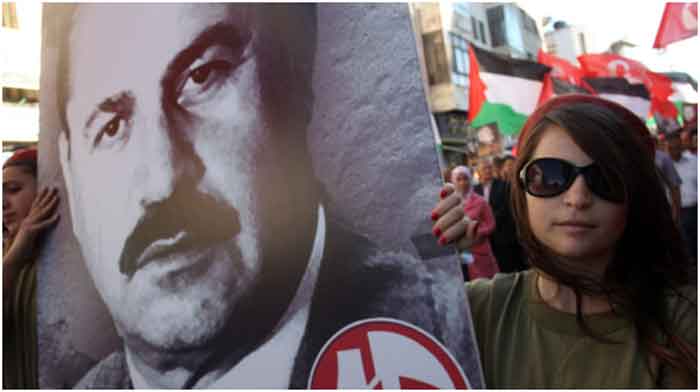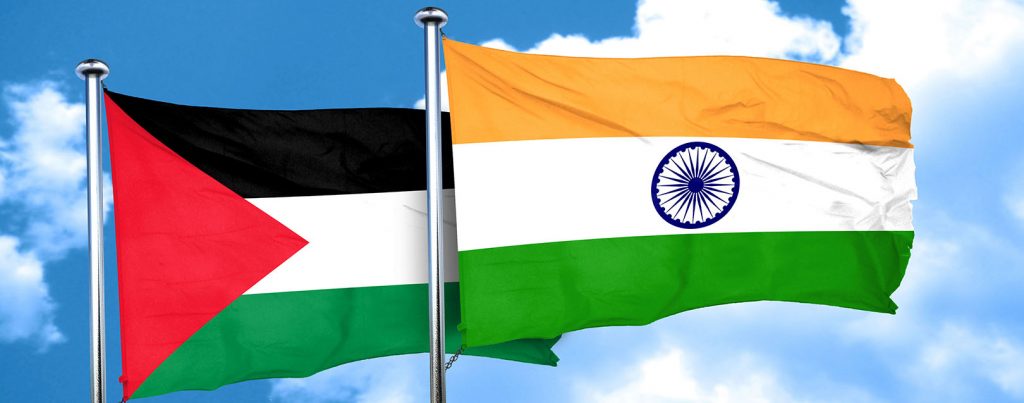
Last Saturday on 27 August we commemorated 21 years since the martyrdom of Abu Ali Mustafa, the General Secretary of the Popular Front for the Liberation of Palestine, targeted for an Israeli assassination raid with a U.S-made and -provided missile in occupied Al-Bireh, Palestine, in 2001.Till this day his memories shimmer like an inextinguishable light.
Abu Ali Mustafa’s was a popular and revolutionary leader of the Palestinian liberation movement, who ignited the spark of the Palestinian resistance and the Palestinian people until his last breath.
Abu Ali was born in 1938 in Arraba, Jenin, and Palestine. At the age of 17, he joined the Arab Nationalist Movement, the Arab liberation movement founded by Al-Hakim, Dr. George Habash, Wadie Haddad, Abu Maher al-Yamani, Basil al-Kubaisi, Ahmad al-Khatib, Hani al-Hindi and their comrades. He played a leading role in the shaping of the Arab Nationalist Movement in the 1950s and 1960s and with daunting courage confronted the repression of the Jordanian regime, which banned political parties; in fact, he was arrested languishing for five years in Jordanian prison, sentenced by a military court for his organizing. Throughout his life, he lit the torch of liberation of the political prisoners from clutches of Zionist, imperialist and reactionary regime prisons.
The PFLP prison branch issued a statement from behind Zionist bars resurrecting the spirit of the comrade inside the prisons today:
“The 21st anniversary of the martyrdom of the leader Abu Ali Mustafa comes at a formative moment in the history of our people, in which the Zionist enemy persists with its ruthless e war against our people. It comes at a shameful moment for stabilising Arab reactionary forces in a U.S. plot against the Palestenian people. These aggressions and schemes are being confronted with relentless resistance, and amidst this battle, the prisoners are relentlessly teaching a lesson to the prison authorities, despite optimum oppression and abuse. In your memory, Abu Ali, we raise our fists in the face of the occupier, announcing the continuation of our resistance. We raise our fists as a greeting from Palestine to all Palestinian, Arab and international resisters. We raise our fists in salute to the masses of our people who are united with the resistance.”
After his release from Jordanian prison in 1961, Abu Ali continued to work with the Arab Nationalist Movement. He became responsible for the northern district of the West Bank of Palestine before joining with Habash and his comrades in co-founding the Popular Front for the Liberation of Palestine. The founding of the PFLP followed al-Naksa in 1967, the occupation of the remainder of Palestine as well as the Syrian Golan Heights and the Egyptian Sinai.
Abu Ali Mustafa was major architect within the PFLP and, thus, within the Palestinian revolutionary movement as a whole. His most notable qualities were humility, sincerity and dedication; loathing being the center of attention. Amid his dedication to establishing the underground organizations of the Front, he most patiently gave a hearing to his comrades and, indeed, the Palestinian people, sharing their experiences and ideas in order to broaden his scope o understanding and leadership.
As Khaled Barakat explains:
“Abu Ali Mustafa treated the Popular Front as his ‘daily workshop’ that does not rest and does not sleep. […] Abu Ali Mustafa was not only fighting for the rights of his people to liberation and return, but he was equally as strongly building the revolutionary tools that could create the act of liberation and help people to extract their confiscated rights: from the women’s institutions to the youth organizations, to the institutions for students, workers and charity, and for military action. These tools are the vehicles of revolutionary organization.”
Upon his return to the occupied West Bank of Palestine in 1999, Abu Ali Mustafa stated: “We return to the homeland to resist, not to compromise.” It was this commitment to resistance, including the armed resistance that led the occupation to arrange for his assassination. The occupation sent shivers down their spine as they felt he posed a mortal threat to its continued military hegemony throughout occupied Palestine, as well as to the Oslo so-called “peace process” and the “Palestinian Authority” acting as a subcontractor for the occupier..
On 27 August 2001, only two years after his return to Palestine, Abu Ali Mustafa was assassinated by occupation forces firing two missiles, produced and provided by the United States, into his office in occupied Al-Bireh. His martyrdom was attended by over 50,000 people, dipping blood in memory of Abu Ali.
Retaliating the targeted assassination of Abu Ali Mustafa, the PFLP targeted the notoriously racist Zionist tourism minister Rehavam Ze’evi several weeks later on 17 October. Ze’evi was widely known for his demands for the complete ethnic cleansing of Palestine. This response sent a clear message from the Palestinian resistance – that the Israeli assassination policy would accepted lying down and that an assassination of Palestinian leaders would be avenged.
Today, the Israeli assassination policy persists with policy of targeting Palestinian leaders. The Palestinian resistance’s battle for the Unity of the Fields, fought just weeks ago and centered in Gaza, illustrated the response to the assassination of Palestinian leaders such as Tayseer al-Jabari and Khaled Mansour, of the Palestinian Islamic Jihad Movement.
Abu Ali Mustafa had a reputation of being an able organizer and architect of organizations. Institutions were fittingly named to honour him after his martyrdom, from schools and sports clubs to the armed wing of the Popular Front. This legacy of the struggle is never tarnished in the Palestinian, Arab and international revolutionary organizations and movements These struggles displayed death-defying courage behind the bars, despite all the internal and external obstacles that are being thrust upon them, confronting the forces of imperialism, Zionism and Arab reaction, as Abu Ali Mustafa did throughout his life.
He said: “We are all targets as soon as we start mobilizing. We do our best to avoid their weapons but we live under the brutal Zionist occupation of our lands and their army is only a few meters away from us…We have a job to do, and nothing will stop us.”
Today, Palestinian prisoners, till the very last hair are waging a crusade for justice and liberation, deploying pressure with hunger strike in resistance. The assassination policy that targeted Abu Ali Mustafa, with the armament and backing of the imperialist powers, simmers till today, robbing the Palestinian people of their beloved leaders and courageous fighters, even as the resistance intensifies. The legacy of Abu Ali Mustafa must inspire us to support the prisoners in their struggle, to give a death blow against imperialism, and to organize to extinguish the assassination policy. At the very core, Abu Ali Mustafa, a truly revolutionary Palestinian national leader, to the last straw upheld the Palestinian and Arab resistance, making clear that the people say “No” to normalization and negotiations, their eyes fixed on return and liberation.
When we resurrect the path of Abu Ali Mustafa and his fellow Palestinian leaders targeted for assassination and imprisonment, we illustrate that the assassination policy will never succeed in throwing to the dust the Palestinian people and the Palestinian, Arab and international liberation movement.
Earlier The Popular Front in Northern Lebanon commemorated the anniversary of the martyrdom of Comrade Abu Ali Mustafa in Beddawi camp, on August 29, 2013 staging a march through the camp including members and supporters of the Front and Palestinian and Lebanese political and social groups from Beddawi and Nahr el-Bared camps. The march began from the entrance of Beddawi camp to terminate at the camp’s memorial to martyrs of the Palestinian revolution, where Comrade Fathi Abu Ali spoke about Abu Ali Mustafa’s legacy, demanding the immediate end to negotiations with the enemy which currently pose the greatest threat to the Palestinian cause.
In Gaza, on August 29, 2013, the PFLP organized a sports tournament in honour of Abu Ali Mustafa at Tawhid Stadium in Gaza City. Comrade Samir Bakr spoke, paying tribute to Abu Ali Mustafa’s legacy of struggle and resistance.
The Palestinian movement is moving like fish in drying waters with genuine anti imperialist struggles on a decline ,absence of any genuine socialist country and even powers of Russia and China waging wars of contention with Western Imperialism. Solidarity struggles have to sprinkle in the hotbeds of imperialism, boycotting Israel. Today imperialist countries have hatched a major conspiracy to patronise Israeli hegemony in the Middle East and cutting Palestinian movement at the very roots. Fall of the USSR caused a major dent to the Palestinian resistance.
Harsh Thakor is a freelance journalist who has extensively studied national liberation movements.












































